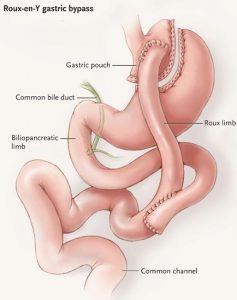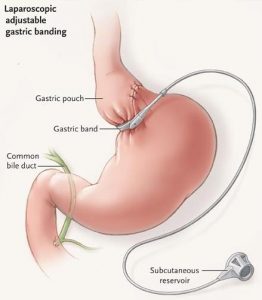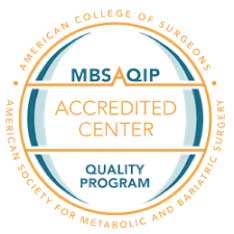If you’re thinking about bariatric surgery, you may be wondering how the whole process works. The Central Maine Healthcare Bariatric Surgery Program is here to provide the information you need, so you know just what to expect at every step. Start with this helpful FAQ.
View our informational video, which is presented by a board-certified surgeon at Central Maine Medical Center in Lewiston, that explores different types of weight loss surgery.
Who is a candidate for weight loss surgery?
For those considering surgery, you need to have a BMI (body mass index) between 35-40 with certain medical conditions associated with obesity, or a BMI greater than 40 with no medical problems.
In addition to the BMI requirement, you must realize that bariatric surgery is not the best weight loss option for all people and that this will be discussed at your consultation with a surgeon. You must remember that bariatric surgery is a TOOL and not cure, for weight loss. Your hard work, good eating habits, and good exercise and lifestyle habits are what will maintain weight loss and keep you healthy.
What are the benefits of bariatric surgery?
There are so many benefits to bariatric surgery! These are both physical and emotional. Bariatric surgery can improve your health and help you to get rid of medical problems and medications you had before surgery. You may have improvement in your energy and ability to do things in your day. You may suffer from less pain in your muscles and joints. Overall, you may see your quality of life has improved dramatically.
What are the risks of bariatric surgery?
All surgeries carry risk with them. Bariatric surgery overall is very safe, with a risk of death around 0.1%. In fact, weight loss surgery decreases the risk of dying from obesity and medical problems related to obesity. Some complications that can occur during or after surgery include things such as bleeding, leak, infections, blood clots, hernias and strictures. Your provider will review specific risks with you during your consultation.
Is weight loss surgery the ‘easy way out’? Should I just work at dieting and exercise?
No. Bariatric surgery is a big commitment and requires you to participate in a program that is several months and requires you to make changes to your diet and exercise habits. Most people who consider bariatric surgery have been struggling with their weight for years, and have tried many diet and exercise programs with variable success.
Most people who suffer from obesity find it hard to lose the weight they want and keep it off with diet and exercise alone. This is because obesity is a chronic disease that creates a vicious cycle leading to greater obesity. Weight gain can be related to many things, such as:
- Food addiction and poor eating habits
- Poor sleep habits
- Eating a diet high in sugar, fats, processed meats and grains
- Eating a diet low in fat fighting foods such as fruits, vegetables, lean proteins
- Mental health issues and stress
- Medications
- Genetics
Weight gain leads to many changes in the body which makes it harder to lose weight. Hormonal changes in the body alter functions that control appetite, feelings of hunger and fullness. Inflammation is heightened in the body’s cells, leading to fatigue and lack of energy. Studies have shown that diet and exercise alone lead to little long-term success. Weight loss surgery helps with long term weight loss because it creates biological changes in the body that help reduce food intake, change the hormonal signals to function properly, and reduce inflammation. It also restricts stomach size (you feel fuller with less) and with certain procedures also alters absorption.
Will my insurance pay for bariatric surgery?
Weight loss surgery is covered by a lot of insurances as long as certain criteria are met. Insurance coverage for program components will depend on your individual health plan. Some insurances will not cover all portions of a program and may require self pay.
We verify benefits with your insurance before your consultation, but it is always a good idea to contact your insurance provider to see if you are covered.
What are the differences between traditional and minimally invasive approaches for surgery?
Minimally invasive surgery (robotic or laparoscopic surgery) is surgery done through multiple small incisions rather than a large incision. Minimally invasive surgery usually means less pain after surgery, smaller scars, and quicker recovery.
How much weight can I expect to lose?
This number is dependent on the type of procedure you have as well as your success in making positive changes to your life regarding your diet and exercise habits. You will go through this more in depth during your consultation.
Will I be on a diet before surgery?
Yes, for 2-3 weeks before surgery you will be on a special diet. This diet is aimed at shrinking the liver and reducing fat inside the abdomen in order to make surgery safer. For certain individuals, it may be determined that they will need to lose a certain amount of weight before being able to have bariatric surgery. Furthermore, some insurance companies will require weight loss before approval.
All patients in the program are participating in medically supervised weight loss through dietician appointments. These visits are aimed more at teaching you about food, healthy habits and tools for long term success after surgery.
Will I be on a diet after surgery?
You will be on a graduated ‘diet’ from liquids to solids over six weeks. Afterwards it will be very important for you to choose healthy items for best results. In general, most patients describe a decrease in their appetite after surgery, and being satisfied with a smaller amount of food.
Are there certain medications I should avoid after surgery?
After surgery you may not take any medication in the NSAID category (NonSteroidal Anti-Inflammatory Drugs) as these may cause complications. You may have to hold certain medications before and after surgery, which you will discuss in your consultation.
Will I have to take vitamins?
Yes. You will need to take multivitamins for life after bariatric surgery. You may also need higher doses of certain vitamins and minerals such as Iron, Calcium and Vitamin D. You will also need to have your vitamin levels checked every year.
Does weight loss surgery cause serious health problems from vitamin deficiency?
In general, as long as you take your vitamins, it is rare to have serious health problems from vitamin deficiency, but weight loss surgery can cause reduced vitamin levels because of changes in food habits and altered absorption. Vitamin deficiency can lead to fatigue, anemia, bone and muscle loss, impaired vision at night, altered senses, changes to mental function and altered immunity.
A healthy diet and the use of supplements will help prevent vitamin deficiency. The ones at biggest risk are those who don’t have a healthy diet, don’t take vitamins and don’t follow-up with their providers to get lab work. Make sure you stay in touch with your bariatric team every year or do your labs with your family provider!
Is exercise an important factor after bariatric surgery?
Yes absolutely! We encourage you to start being active as soon as possible. Remember, exercise is different for everyone and there is not a ‘one size fits all’ exercise plan. What’s most important is that you are participating in exercise that increases your heart rate and helps you build muscle. Exercise is a very important component of your successful weight loss journey, and is important to maintain your overall health as you age! If you are at a loss of what that looks like for you, we have resources to help.
How soon after surgery can I drive?
For your own safety, you shouldn’t drive until you have stopped taking narcotic medications and can move quickly and alertly to stop your car, especially in an emergency.
How long do I have to be off work?
This depends on what you do for work. You may take as little as 1-2 weeks off of work or you may require 4-6 weeks depending on your job.
Will I lose hair after weight loss surgery?
You may. Some patients do experience some hair loss or thinning in the first six months after surgery. This is usually due to hormonal changes during rapid weight loss. Hair loss is usually temporary. While we don’t fully understand hair loss, we do know that good nutrition and adequate protein intake, as well as taking vitamins, will help.
Will I have excess skin after my surgery?
You may have excess skin after surgery but this is dependent on many individual factors such as how much weight you have to lose, how quickly you lose it, your age and your exercise habits. Some patients choose to have surgery to remove skin after weight stabilization, either for cosmetic purposes or because of recurrent skin infections.
Can I become pregnant after weight loss surgery?
Yes, you can. In fact, most women are much more fertile after surgery and weight loss. In general, it is recommended that you wait at least one year after surgery to become pregnant and very strongly recommended that you use a form of birth control at all times. Your cycle may be very irregular and you may become pregnant when you least expect it.
What is dumping syndrome?
‘Dumping Syndrome’ is a side effect that can happen after gastric bypass when a patient eats something high in sugar or carbohydrates. Because of the altered way in which the body handles these things after gastric bypass, one may have feelings such as abdominal cramps, racing heart, cold sweats, light-headedness and diarrhea. This may last anywhere from 30 minutes to an hour. Treatment for dumping syndrome revolves around diet modification.ber is 207-795-2559.



